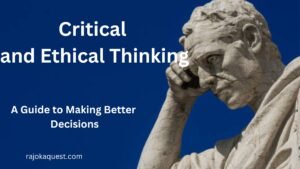Coaching and Mindfulness: A Powerful Combination for Personal and Professional Growth

Breathing exercise and mindfulness meditation concept. Waist up portrait of calm woman with closed eyes practicing yoga. Young female relief stress at home.
Coaching and Mindfulness: A Powerful Combination for Personal and Professional Growth
People and companies always look for ways to improve performance and raise personal and professional objectives in today’s fast-paced world. Two methods that have attracted a lot of attention lately are mindfulness and coaching. While everyone has advantages and a different approach, coaching and mindfulness are potent and transforming tools for personal development and progress. This paper investigates the synergy between mindfulness and coaching, their complementing effects, and the reasons behind their integration for people wishing to improve their personal and professional lives.
Understanding Coaching
Coaching is a team effort to enable people to develop their potential and fulfil their goals. Under this arrangement, a coach supports, guides, and assumes responsibility alongside a client. Many times, goal-oriented coaching emphasizes particular areas, including job development, leadership, personal development, or health and well-being, using questioning, active listening, and feedback, among other approaches, to assist clients in getting clarity, recognizing their strengths and shortcomings, creating concrete goals, and building strategies to reach those goals. A coach’s job is to help the client on her path of self-discovery and empowerment rather than to offer solutions.
Understanding Mindfulness
Mindfulness involves being present at the moment and engaged with whatever is occurring, either inside or around us. It involves learning to pay nonjudgmental attention to our ideas, emotions, physical sensations, and surroundings. Though it has been modified and included in contemporary psychology and health programs, mindfulness originated in ancient meditation techniques.
Research demonstrating mindfulness’s positive effects on lowering stress, anxiety, and depression is abounding. It improves general bingeing, emotional control, and attention span. Through developing mindfulness, people become more conscious of their habitual patterns, thinking processes, and behaviours, enabling their response to the demands of daily life.
The Synergy Between Coaching and Mindfulness
Combining mindfulness with coaching produces a great synergy that increases the potency of both techniques. They work in this way:
- Enhanced self-awareness: Mindfulness helps people see their ideas and emotions without entanglement. This increased self-awareness is vital in coaching since it allows clients to recognize their goals, needs, and obstacles. Mindful awareness brought into the coaching process helps clients better understand their behaviour and perspective, enabling more significant and long-lasting transformation.
- Focused Goal Setting: Coaching stresses setting clear, reasonable goals. Mindfulness delivers value by enabling clients to become more tuned to their ambitions instead of goals motivated by outside pressure or societal expectations. Mindful awareness guarantees that the objectives established during coaching match the client’s authentic self and fundamental values, enhancing the fulfilment and relevance of the quest for these goals.
- Improved Emotional Regulation: Emotions often impede personal development and cause rash decisions or inactivity. Mindfulness helps people see their feelings without allowing them to control them. This capacity to control emotions helps clients in a coaching environment remain calm and composed even in demanding situations. It guides their decisions toward knowledge instead of reacting out of annoyance, anxiety, or fear.
- Increased Resilience: Though in distinct ways, mindfulness and coaching help develop resilience. Coaching increases resilience by arming clients with tools and techniques to manage challenges and setbacks. By encouraging a nonjudgmental acceptance of whatever emerges, mindfulness helps people stay grounded and balanced, strengthening resilience. Taken together, they provide a vital means of negotiating the ups and downs of life.
- Greater Presence and Focus: Coaching regularly challenges keeping clients present and engaged. Mindfulness practice directly tackles this by teaching the mind to stay anchored in the present moment. This extra attention and presence raises the coaching sessions’ calibre and enables clients to be more present and involved in their everyday lives and businesses.
Practical Application of Coaching and Mindfulness
There are practically several approaches to improving personal and professional development by combining mindfulness with coaching:
- Mindful Listening and Communication:
Coaches might use mindfulness practices to improve their listening and speaking abilities. Mindful listening means paying the client full attention, free from distractions and preconceptions. This profound degree of listening develops a closer relationship and understanding between coach and client, leading to more effective coaching sessions.
- Mindful Goal Setting and Reflection:
Clients’ encouragement to approach goal setting deliberately guarantees that their objectives align with their values and intents. Through careful introspection on development, clients can evaluate their path free from harsh self-criticism, fostering a more optimistic and constructive attitude.
- Coaching Session Mindfulness Exercises: Including mindfulness practices such as body scans, guided meditations, or breathing exercises in coaching sessions will help clients centre themselves, relax, and open more profoundly. These techniques prepare the mind for introspection and improve the efficacy of the coaching process.
- Developing a Daily Mindfulness Practice: Coaches can inspire clients to create a consistent mindfulness practice as part of their personal development agenda. This can call for regular meditation, conscious walking, or just pauses throughout the day to inhale. Regular mindfulness helps to encourage ongoing personal development and improves the abilities acquired in coaching.
- Mindful Leadership Coaching:
Mindful leadership coaching guides leaders professionally toward developing presence, compassion, and emotional intelligence. Mindfulness helps leaders control stress, make more deliberate decisions, and establish a friendly workplace. Leaders who mix mindfulness with leadership coaching can acquire the tools to lead with integrity and authenticity.
The Benefits of Mindfulness and Coaching in the Workplace
In the workplace, mindfulness combined with coaching offers excellent advantages that make a more engaged, resilient, and effective workforce workforce. Those companies who include these ideas in their daily operations usually find the following benefits:
- Sustainable Personal Growth: Coaching helps one stay in a constant cycle of goal setting, action, and introspection. Combining mindfulness with this cycle makes it more sustainable. Mindfulness guarantees people’s continued connection to their inner ideals and helps them keep a clear sense of direction. Human development is more sustainable since this alignment is motivated by real needs rather than transient goals or outside approval.
- Enhanced Emotional Intelligence: Mindfulness and coaching help one grow emotionally intelligent (EI). While mindfulness increases awareness of one’s emotional terrain, coaching offers the means to grasp and control emotions. This increases one’s capacity to negotiate interpersonal relationships, handle problems, and lead with empathy.
- Building a Growth Mindset: A significant determinant of success is a growth mindset that believes intelligence and abilities may be developed through effort and education. Coaching helps clients embrace a growth mindset by challenging limiting ideas and supporting a proactive attitude to learning and development. Mindfulness helps this attitude be receptive and nonjudgmental toward difficulties and mistakes. All taken together, they provide a solid basis for flexibility and lifetime learning.
- Resilience in the Face of Change: Resilience, work, and life naturally involve change. One of the most essential skills is adjusting to change without feeling overburdened. Mindfulness helps people remain grounded and present, lowering the worry that sometimes accompanies change. Coaching offers techniques to negotiate change properly, thus enabling people and companies to stay intense and focused. This mix guarantees that change is controlled and welcomed as a development chance.
- Improving Work-Life Balance: The modern workplace often blurs personal and professional life boundaries, causing stress and burnout. Mindfulness helps people set clear boundaries by encouraging present-moment awareness and lowering the tendency to overthink or fret about activities outside the office. By guiding people toward specific objectives and priorities, coaching ensures that their time and effort match what counts. They all encourage a good work-life balance, improving general well-bowel well-being and contentment.
The Role of Technology in Mindfulness and Coaching
With the advent of digital technologies, coaching and mindfulness have become more widely available. Online coaching sites, mindfulness apps, and virtual reality experiences are transforming people’s interactions with mindfulness and coaching. Technology is helping to define these professions’ future as follows:
- Accessibility and Convenience:
Convenience and accessibility abound. Mindfulness apps and online coaching allow people to participate in these techniques from anywhere, at their convenience. This accessibility would be especially helpful for those with hectic schedules, distant workers, or those living in places with limited access to mindfulness centres or expert trainers.
- Scalability: Technology makes it feasible to reach a bigger audience by allowing coaching and mindfulness programs to be scalable. Companies can run company-wide initiatives, and people can extend the influence of these ideas by attending group coaching meetings or online mindfulness classes.
- Personalization: Digital platforms provide individualized coaching and mindfulness experiences catered to particular requirements and interests. Using user data analysis, AI-driven systems can generate personalized recommendations, monitor development, and modify programs depending on user comments. This degree of personalization guarantees that people get the help they need, improving the efficacy of mindfulness and coaching.
- Enhanced Engagement: Interactive tools such as guided meditations, live coaching sessions, and virtual reality experiences improve involvement and immersion in mindfulness and coaching techniques. These technologies keep people inspired and dedicated to their path of personal development by producing a more dynamic and interactive experience.
- Data-Driven Insights: Technology offers insightful data and tools that could improve coaching and mindfulness practices. Data analytics lets coaches and people monitor development, gauge results, and spot trends. These realizations guide the coaching process, enabling more focused interventions and ongoing development.
Conclusion
Combining mindfulness with coaching provides a potent method for personal and professional development. Awareness and presence developed through mindfulness combined with the the-oriented, action-oriented character of coaching help people achieve success and fulfilment. These techniques improve well-being and help people gracefully and wisely negotiate the demands of life.
Practical personal development tools are more important than ever in a fast-paced, ever more complicated environment. Combining mindfulness with coaching offers a whole approach that addresses the mind, body, and spirit, guiding people toward a more significant and balanced existence. Whether in personal or professional settings, combining mindfulness and coaching provides a transforming road to reach one’s best potential and lead a life of purpose and joy.
Read More, Click here.
- Enhanced Employee well-being techniques help employees be less stressed and more well-adjusted. When combined with coaching, staff members can better handle obstacles, maintain a good attitude, and preserve their mental and emotional health.
- Improved Performance and Productivity:
While mindfulness sharpens focus and concentration, coaching gives staff members the tools and tactics to raise performance. Their combined output results from more engaged and motivated staff members.
- Better Decision Making: Mindfulness helps one be clear and present, assisting people to make decisions from a place of peace and awareness. Coaching helps staff members create decision-making systems. The combination results in more careful and successful decision-making procedures.
- More robust Team Dynamics: Coaching and mindfulness help increase self-awareness, empathy, and good communication skills, strengthening team dynamics. Strong team dynamics, encouragement of cooperation, and conflict reduction all depend on these abilities. Teams that practice mindfulness together grow more cohesively and with trust.
- Increased Creativity and Innovation: Mindfulness helps open the mind to fresh ideas and possibilities. Employees encouraged by coaching instead of mired in anxiety are more likely to be creative and provide original ideas.
Effects of Mindfulness and Coaching Over Time
Combining mindfulness with coaching has quick advantages and promotes long-term progress. These ideas can help to bring about long-lasting transformation:
- Sustainable Personal Growth: Coaching helps one stay in a constant cycle of goal setting, action, and introspection. Combining mindfulness with this cycle makes it more sustainable. Mindfulness guarantees people’s continued connection to their inner ideals and helps them keep a clear sense of direction. Human development is more sustainable since this alignment is motivated by real needs rather than transient goals or outside approval.
- Enhanced Emotional Intelligence: Mindfulness and coaching help one grow emotionally intelligent (EI). While mindfulness increases awareness of one’s emotional terrain, coaching offers the means to grasp and control emotions. This increases one’s capacity to negotiate interpersonal relationships, handle problems, and lead with empathy.
- Building a Growth Mindset: A significant determinant of success is a growth mindset that believes intelligence and abilities may be developed through effort and education. Coaching helps clients embrace a growth mindset by challenging limiting ideas and supporting a proactive attitude to learning and development. Mindfulness helps this attitude be receptive and nonjudgmental toward difficulties and mistakes. All taken together, they provide a solid basis for flexibility and lifetime learning.
- Resilience in the Face of Change: Resilience, work, and life naturally involve change. One of the most essential skills is adjusting to change without feeling overburdened. Mindfulness helps people remain grounded and present, lowering the worry that sometimes accompanies change. Coaching offers techniques to negotiate change properly, thus enabling people and companies to stay intense and focused. This mix guarantees that change is controlled and welcomed as a development chance.
- Improving Work-Life Balance: The modern workplace often blurs personal and professional life boundaries, causing stress and burnout. Mindfulness helps people set clear boundaries by encouraging present-moment awareness and lowering the tendency to overthink or fret about activities outside the office. By guiding people toward specific objectives and priorities, coaching ensures that their time and effort match what counts. They all encourage a good work-life balance, improving general well-bowel well-being and contentment.
The Role of Technology in Mindfulness and Coaching
With the advent of digital technologies, coaching and mindfulness have become more widely available. Online coaching sites, mindfulness apps, and virtual reality experiences are transforming people’s interactions with mindfulness and coaching. Technology is helping to define these professions’ future as follows:
- Accessibility and Convenience:
Convenience and accessibility abound. Mindfulness apps and online coaching allow people to participate in these techniques from anywhere, at their convenience. This accessibility would be especially helpful for those with hectic schedules, distant workers, or those living in places with limited access to mindfulness centres or expert trainers.
- Scalability: Technology makes it feasible to reach a bigger audience by allowing coaching and mindfulness programs to be scalable. Companies can run company-wide initiatives, and people can extend the influence of these ideas by attending group coaching meetings or online mindfulness classes.
- Personalization: Digital platforms provide individualized coaching and mindfulness experiences catered to particular requirements and interests. Using user data analysis, AI-driven systems can generate personalized recommendations, monitor development, and modify programs depending on user comments. This degree of personalization guarantees that people get the help they need, improving the efficacy of mindfulness and coaching.
- Enhanced Engagement: Interactive tools such as guided meditations, live coaching sessions, and virtual reality experiences improve involvement and immersion in mindfulness and coaching techniques. These technologies keep people inspired and dedicated to their path of personal development by producing a more dynamic and interactive experience.
- Data-Driven Insights: Technology offers insightful data and tools that could improve coaching and mindfulness practices. Data analytics lets coaches and people monitor development, gauge results, and spot trends. These realizations guide the coaching process, enabling more focused interventions and ongoing development.
Conclusion
Combining mindfulness with coaching provides a potent method for personal and professional development. Awareness and presence developed through mindfulness combined with the the-oriented, action-oriented character of coaching help people achieve success and fulfilment. These techniques improve well-being and help people gracefully and wisely negotiate the demands of life.
Practical personal development tools are more important than ever in a fast-paced, ever more complicated environment. Combining mindfulness with coaching offers a whole approach that addresses the mind, body, and spirit, guiding people toward a more significant and balanced existence. Whether in personal or professional settings, combining mindfulness and coaching provides a transforming road to reach one’s best potential and lead a life of purpose and joy.
Read More, Click here.





